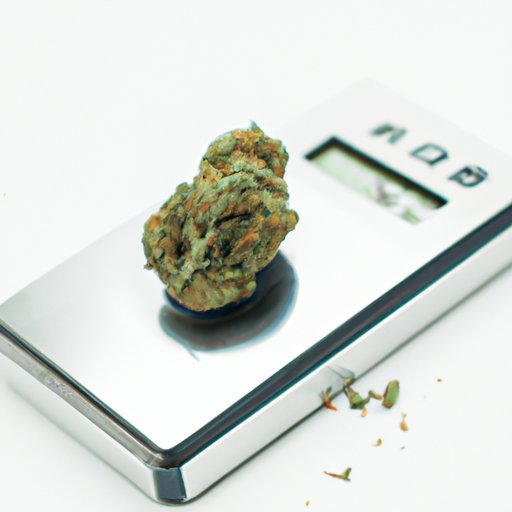
Introduction
There is a common misconception that using weed causes weight loss. In reality, the relationship between cannabis and weight management is complicated and multifaceted. The purpose of this article is to separate fact from fiction and provide accurate information on how cannabis affects weight loss and gain. We’ll explore the science behind weight loss on weed, discuss the potential benefits and drawbacks of using cannabis for weight management, and provide tips for individuals interested in using cannabis to achieve their weight loss goals.
The Skinny on Weed: Separating Fact from Fiction
There are many myths and misconceptions about the relationship between cannabis use and weight loss. One of the most widespread beliefs is that smoking weed causes the munchies, leading to overeating and subsequent weight gain. However, the reality is more complex than that.
In fact, some studies suggest that regular cannabis users have a lower body mass index (BMI) than non-users. This counterintuitive finding has led to speculation about the weight loss properties of cannabis. But the truth is not so simple.
Why Some People Lose Weight on Weed: A Scientific Explanation
The effects of cannabis on the body’s metabolism and appetite can vary depending on individual factors such as genetics and consumption method. However, research has identified certain mechanisms by which cannabis may lead to weight loss.
THC, the primary psychoactive component of cannabis, has been shown to stimulate appetite in some individuals. However, other cannabinoids found in the plant, such as CBD, can have the opposite effect. In addition, some studies suggest that cannabis can boost metabolism and fat burning.
Weight Loss or Weight Gain: How Cannabis Affects Different People in Different Ways
Understanding how cannabis affects your weight can be complicated by individual factors such as body type, genetics, and pre-existing medical conditions. Some people may find that using cannabis helps them lose weight, while others may experience the opposite effect. Personal anecdotes and experiences from individuals who have used cannabis for weight loss can shed light on the variety of outcomes that can occur.

Weed and Weight Loss: What the Research Says
A growing body of research has explored the relationship between cannabis use and weight loss. For example, a study published in the American Journal of Medicine found that regular cannabis users had lower fasting insulin levels and smaller waist circumference than non-users, suggesting a protective effect against obesity and related metabolic disorders.
However, it is important to note that research in this area is still limited and often conflicted. More high-quality studies are needed to fully understand the link between cannabis and weight management.
Cannabis as a Weight Loss Aid: Benefits and Drawbacks
While cannabis may offer benefits in terms of weight loss, there are also potential risks and drawbacks to consider. For example, overeating or bingeing on high-calorie snacks while under the influence of cannabis is a common experience, which can lead to weight gain over time. Additionally, prolonged use of cannabis can lead to dependence or addiction, which can further complicate efforts to maintain a healthy weight.
It’s worth noting that cannabis is not a magic solution for weight loss. Rather, it is one tool among many that individuals can use to manage their weight. Other weight loss aids such as prescription medications or fad diets also come with potential benefits and drawbacks. Ultimately, it is up to each individual to weigh the risks and benefits of using cannabis in the context of their own weight loss goals.
How to Use Cannabis to Achieve Your Weight Loss Goals
If you are interested in using cannabis to aid in your weight loss journey, there are several factors to consider. First, it is important to select the right strain that will work for your body. For example, strains that are high in CBD and low in THC are less likely to stimulate appetite and more likely to have a calming effect that can help reduce anxiety and stress-related eating.
It is also important to be mindful of dosage, as using too much cannabis can lead to overeating or other negative effects. Edibles in particular can be tricky to dose, as the effects can be delayed and last for several hours.
Finally, it is important to discuss cannabis use with a medical professional, particularly if you have any pre-existing medical conditions or are taking medication that may interact with cannabis.
Cannabis and Fitness: How Some Athletes Use Weed to Boost their Workouts and Burn Fat
In recent years, there has been a growing trend of using cannabis in the fitness world. Some athletes claim that using cannabis before or after workouts can help them achieve better results in terms of muscle recovery, inflammation reduction, and fat burning.
However, it is important to note that cannabis is still a prohibited substance in most competitive sports, and its use can lead to disqualification or other penalties. Athletes interested in exploring the potential benefits of using cannabis in the context of their workouts should do so with caution and consult with their coaches and medical providers.
Conclusion
The relationship between cannabis and weight management is complex and not fully understood. While some research suggests that cannabis may offer benefits in terms of weight loss, there are also potential drawbacks and risks to consider. If you are interested in using cannabis to aid in your weight loss journey, it is important to do your research, be mindful of dosage, and discuss your options with a medical professional. Ultimately, the best approach to achieving a healthy weight is a multifaceted one that includes regular exercise, a balanced diet, and healthy lifestyle habits.





